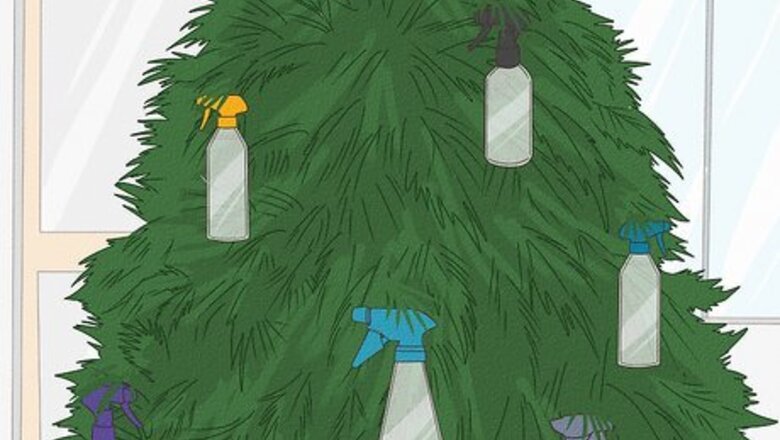
views
Decorating the Tree
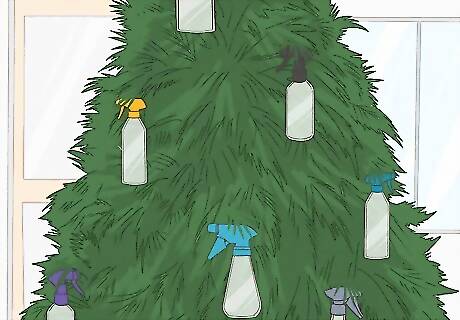
Consider not decorating the tree initially. The rationale behind this is to provide an adjustment period for the cat, as well as a possible lesson for your cat in leaving the tree alone. Letting the cat adjust to the new tree should help deter the cat from trying to mess with it. Fill a spray bottle with water and hang on to it. Set the tree in place, then let the cat in to investigate but hover in the background with the spray bottle, just in case. If your cat shows any signs of wanting to leap at or on the tree, spritz them lightly with water on their back and give a stern "NO!"
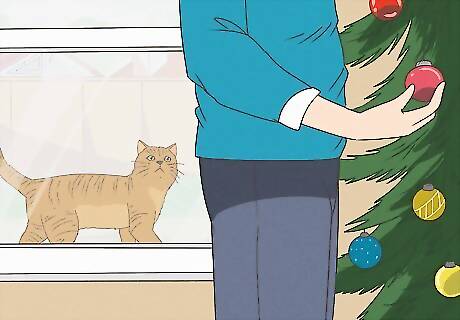
Decorate the tree with your cat firmly out of the way. It's hard enough fiddling with trees, decorations, and breakable ornaments without also having felines running up past you and chasing after the objects as you're gingerly hanging them up. Your cat will assume this is a game you intend for it to play, so it's just easiest to keep the cat out of the way until everything has been set up. While decorating, if your cat is about, resist the urge to tease her with decorations as you're adding them. Doing so will only encourage the cat to see the glittery items as toys and things to swat any time it pleases.
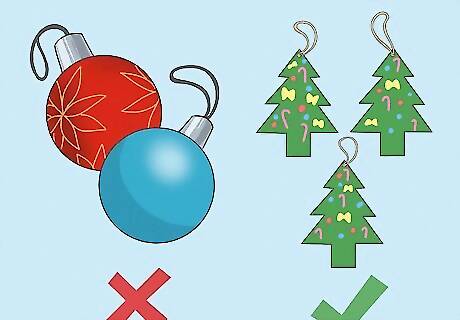
Choose ornaments less likely to be attractive to your cats. Some ornaments will prove irresistible because they sparkle, glow, dangle, and shimmer. Blander, less shiny or flat matte objects which don't dangle much will have less allure for your cat. Felt, paper, and plain decorations might be the best choice. Avoid anything that dangles a lot, jumps about, or spins. Try plastic ornaments instead of glass, as they are less breakable. Try to find shatter-proof bulbs and ornaments. Twist the wire ornament hook around the branch instead of just hanging from the hook shape provided. Never put catnip-stuffed items on the tree. That's just asking your cat to mess with the tree.
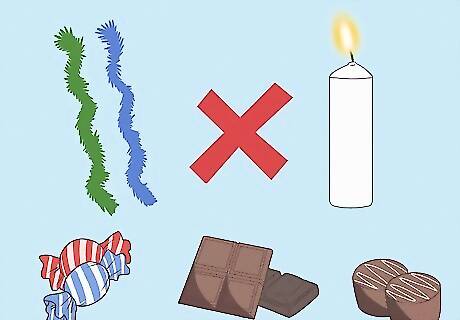
Consider not having certain decorations at all. Tinsel is potentially hazardous for cats who tend to chew and swallow things they find lying around. Ribbons and other items that dangle from the tree can also be potentially harmful to your cat. Artificial snow is toxic and should not be used when you have pets and small children. Tinsel is not recommended for households with cats; it can cause choking or other internal problems if swallowed, such as intestinal blockage. Don't use real candles on a tree when you have pets. They may knock the candle over with a quick swipe of the paw and start a fire. If you like decorating the tree with food, be careful what you add. Chocolate of any kind is toxic for cats and the odor may be tempting to them. Lots of sweets aren't healthy for cats either.
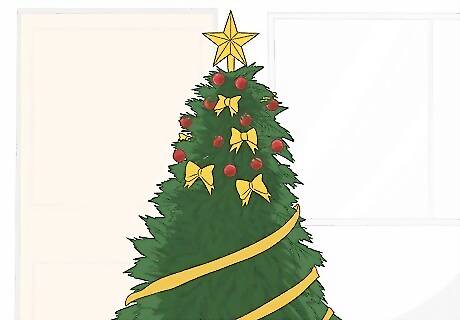
Place decorations that are especially delicate high up on the tree. For ornaments that are more breakable, enticing, or dangerous, try positioning them in the top two-thirds of the tree. Your cat is less likely to reach for higher parts of the tree, which will help to keep these items safe. Some people choose to not even decorate the lower third of the tree at all. That way, there is nothing of interest at the cat's eye level. Some cats cannot help themselves and will climb up high whatever you do. If your cat is like this, avoid having any delicate or potentially dangerous items on the tree at all. Tinsel, if used at all, should be placed up high as it is likely to be dragged off by a curious cat. Tinsel can be very harmful if ingested and get caught in the stomach and intestines.
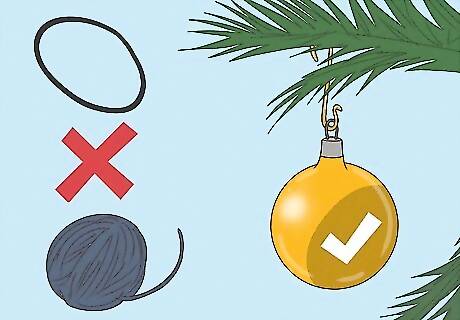
Attach ornaments to the tree securely. Use metal hooks that clamp to the tree so that they cannot be simply pelted or lifted off. Avoid using string, rubber bands, or anything else dangly to attach the ornaments with. When you've attached the decorations, give them a tug to check that they are securely fastened to the tree and don’t fall off easily. Hang ornaments by using quality wire ornament hangers. Use a pair of pliers to clamp the hook part around the branch so that it doesn't dangle and cannot be simply pulled off.
Adding Extra Protection
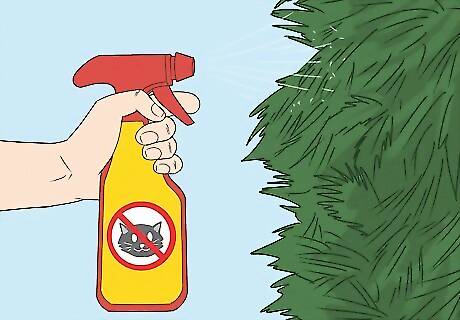
Use repellant sprays. Spray your Christmas tree with a cat-repellant spray that you can purchase at your local pet supply store. This will deter your kitty without leaving a noticeable odor to human noses. Or, you might try a citrus spray, as cats are repelled by citrus odor too. Apple cider vinegar can also be sprayed as a cat repellant. If it's a plastic tree, shake a small amount of Citronella oil into a bottle of water and mist it on to the tree. The smell will be unpleasant to the cat but fresh and citrus-like to you. Spray some pine cones with Citronella and pile them around the base of the tree. Cats do not walk on pine cones! Pine cones also have the same effect in the base of your houseplants. You could also place orange peels under the tree to make your cat less likely to go near it. Cats also dislike the smell of rotten apples, but then you probably won't like that smell much either! Try spraying your tree with a little orange juice. Cats hate the smell of citrus, so orange juice can act as a deterrent. Slices of orange can also be used for decoration.
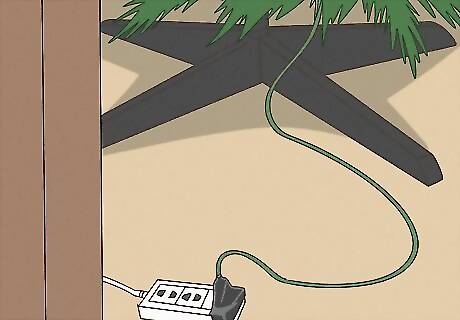
Be careful with electrical wires and lighting. Be sure to tape down excess wire and to make it too hard for the cat to reach the power point or where the cords join. Do not leave any wires dangling – wrap wire around the base of the tree rather than having it dangling anywhere. It can also be helpful to cover exposed wires in wire covers or piping to prevent the cat from chewing them. Cords can also be coated with cat-repellant sprays. Just be careful not to spray too much liquid on the electrical cords – a light misting will do. Plug the tree lights into a short indoor extension cord and tape the plug into the socket with electrical tape. Simply unplug the lights from the extension cord to turn them off. Consider using cords that shut off if damaged. Always turn off Christmas tree lights when there is no responsible adult in the room to keep an eye on them.
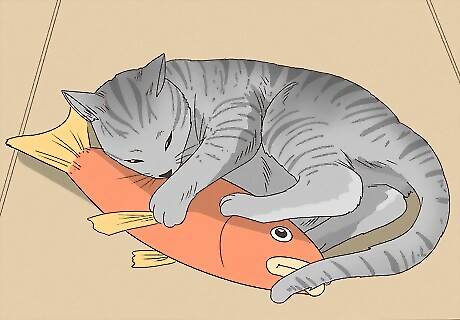
Distract your cat. Place toys the kitty likes in the same room as the tree and place his/her scratching post reasonably near to the tree. These are the cat’s things and encourage the cat to use them rather than hang around the tree. Burn your cat’s extra energy by engaging in playtime. This will leave the cat with less energy to attack the tree. Keep all of the cat’s water, food, and beds in a different room. This will make the cat less tempted by the tree.
Choosing and Securing the Tree
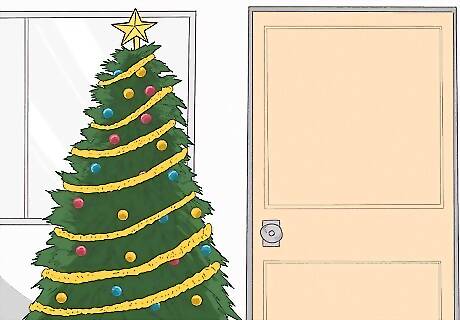
Choose a safe location for the tree. There should be plenty of room around the tree so that it isn't too near items that are easily climbed by cats. If there are tempting shelves or furniture pieces to act as launch pads for your cat, it will be very likely to jump off them and land on the tree. Keep the tree in a clear space that makes jumping either difficult or unlikely. If possible, place the tree in a room where you can shut the door at night to keep the cats away. You could anchor your tree to the wall for a little extra security. Use a screw and thin wire, so you won't be able to see it.
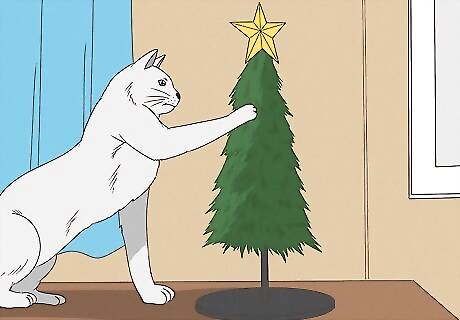
Consider the size of the tree. A small tree will be safer than a larger tree because there is less weight to crash down if your cat decides to climb it and things go horribly wrong. For a kitten, a tabletop tree might be a suitable choice until it grows up and becomes a bit calmer. If the tree is shorter than 6 feet (180cm), use duct tape to tape the legs of the holder to a piece of wide plywood and put the whole tree on a short but very sturdy table. This keeps the tree above the level of the cat and the cat will likely be less interested. Ensure that the tree is nowhere near any launching points for an opportunistic jump.
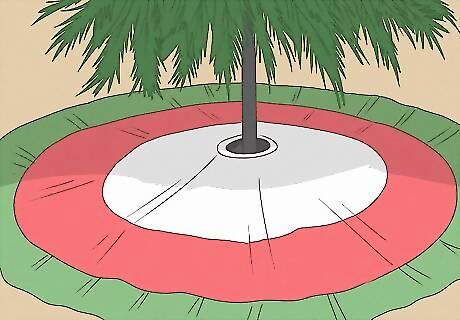
Select a strong and unwavering base for holding the tree. Always use caution when selecting a tree base and get one that is guaranteed to stay firmly in place if the tree is knocked over. This is as important for the safety of children as it is for pets. Even an artificial tree should have a firm and solid base. Use a tree skirt to hide all ugly but practical safety fixes at the base of the tree, including electrical items. As well as a solid base, anchor the tree to the wall or ceiling to help prevent it from toppling over should your cat land in the tree or pull on it.

Decide whether you want an artificial or real tree. Real Christmas trees are potentially more dangerous to your cat than artificial ones. This is because the needles on a real tree are sharp and can pierce or puncture the skin of an overly curious cat, while the pine needles themselves are irritating to mildly toxic if chewed (depending on the species of tree used). A chewed artificial tree isn't healthy for your cat to ingest either, so balance the choice of tree type with how you intend to keep the tree safe from your cat. If you do choose a real tree, also choose a water container for the tree that is completely inaccessible to the cat. If your kitty tries to drink from it, there is a risk of poisoning.


















Comments
0 comment